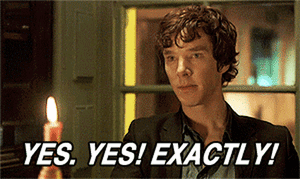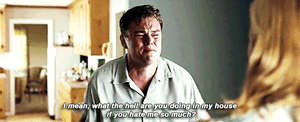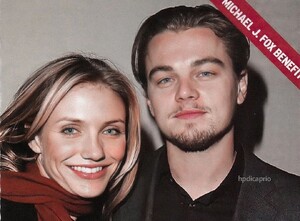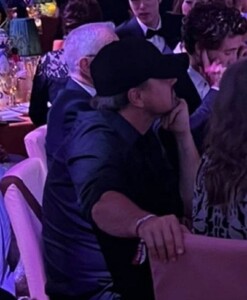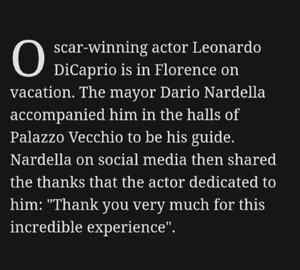
Everything posted by Jade Bahr
-
Leonardo DiCaprio (GENERAL DISCUSSION)
@Emmarosebecause everything you read on the internet has to be true right? Especially on gossip sites. Actually I met Leo in 2010 and hooked up with him (among other things) in his gorgeous hotel room in Berlin while Bar was doing some girls stuff with his mom - even though the two ladies never got really warm for each other in all those years. Leo pretended being not so well at this day so he could spend some time with me. I lived in Berlin for about 6 months so I showed him a bit of the city (even though it was freezing and he hates to freeze). Anyway he still loved it because he loves culture and art and Berlin is full of history. Also his german is better than you might think in the right time Also his Bodyguard back then? I dropped something and he was there to pick it up. Total sweetheart. I was just 19. So pls tell me what's the truth here and what's not? (and believe it or not some of this is true lol)
-
Leonardo DiCaprio (GENERAL DISCUSSION)
Nor has he too change just the smallest tiny bit of his personality just because some stranger demand it from him in the meanest disrespectful way, acting to know everything about him and what's best or actually worse for him and his career. Give me a break. I mean who gives you the right to offend Leo and his circle (family, friends, girlfriend) at any occasion but expecting the same time respect for such shitty posts from us??? It's absurd. But calling us bullies??? Seriously what is wrong with you? It's the same you giving a shit about my opinion. So why the heck Leo should give something on yours or whoever he will never met in his life??????????
-
Leonardo DiCaprio - (Please Read First Post Prior to Posting)
Me 2 💖 If I could I would LIVE in a cinema 🍿 Craziest cinema expierence? I watched all 5 Twilight movies in a special in one day 😄🧛♀️ Most watched movies? The Departed & The Great Gatsby 12×
-
Leonardo DiCaprio (GENERAL DISCUSSION)
Nobody is forcing you to be here. Not Leo, not me nor the other users here. If you think so badly about Leo, his fans and us in particular you maybe shouldn't be in a place where fans ACTUALLY LIKE LEO and think fandom is something positive and not some ugly shit you turn literally everything Leo is doing.
-
Leonardo DiCaprio (GENERAL DISCUSSION)
^Leo probably if he read those comments (what he luckily never will because well he is just living his life no matter what people think of - must be a pain in the ass for such "fans". that's actually kinda satisfying lol)
-
Leonardo DiCaprio - (Please Read First Post Prior to Posting)
-
Leonardo DiCaprio - (Please Read First Post Prior to Posting)
^ @Mirellathis is why Tom Cruise made 100 million dollar with Top Gun 2 for example. It passed the 1 billion dollar mark at the box office beating even Titanic on the US market (and according to Tom using a streaming service was never an option). You can say about Tom Cruise whatever you want but that's quite impressive especially by considering that Top Gun 2 isn't good at all lol https://faroutmagazine.co.uk/tom-cruise-top-gun-streaming-debut/
-
Leonardo DiCaprio - (Please Read First Post Prior to Posting)
Inside Movie Stars’ Salaries (...) That doesn’t mean that movie stars need a bailout. The streaming wars have been very good for their bottom lines. Apple will pay Leonardo DiCaprio $30 million to reteam with Martin Scorsese on the historical drama “Killers of the Flower Moon,” as well as shell out $30 million to Brad Pitt for getting behind the wheel of a currently untitled Formula One drama from “Top Gun: Maverick” director Joseph Kosinski and $35 million to Will Smith for appearing in the escaped-slave thriller “Emancipation.” Not to be outdone, Netflix will pony up $20 million for Chris Hemsworth and $10 million to Millie Bobby Brown to reprise their roles in the upcoming sequels to “Extraction” and “Enola Holmes.” (...) But those gaudy paydays come with caveats. Apple has included clauses in some contracts that make bonuses contingent on films coming in on time and on budget. And all of the streamers are essentially paying out the actors’ backends. That eliminates the risk that their movies will collapse at the box office, which would theoretically deprive them of all those bonuses. Yet it also puts a cap on their potential earnings if, say, “Killers of the Flower Moon” is a globe-straddling phenomenon. (...) The good times may not last. There’s a nagging sense that as the country braces for recession and media companies see their stock prices plunge, stars could start to feel the pinch. After years of free spending, Netflix has signaled to investors that it is serious about maintaining its operating margins at 19% to 20%. That’s made the streamer much more selective about writing huge checks for buzzy projects. At the same time, companies like Warner Bros. Discovery are grappling with heavy debt loads and have made a commitment to slash costs. To be fair, Apple, with a market cap of $2.4 trillion, seems unlikely to be forced to belt-tighten, but at some point all this economizing will have a trickle-down effect in terms of star salaries. Full article
-
Leonardo DiCaprio - (Please Read First Post Prior to Posting)
Leonardo DiCaprio Will Get Massive Payday For Scorsese's Next Movie A new report reveals Leonardo DiCaprio's massive payday for Martin Scorsese's new movie coming to Apple TV+, Killers of the Flower Moon. Leonardo DiCaprio's massive payday for Martin Scorsese's new movie Killers of the Flower Moon has been revealed. The upcoming historical drama marks the sixth collaboration between the legendary director and Oscar-winning actor, including Gangs of New York, The Aviator, The Departed, Shutter Island, and The Wolf of Wall Street. Co-adapted by prolific screenwriter Eric Roth and based on the 2017 book of the same name, Killers of the Flower Moon will chronicle the mysterious murders of members of the Osage tribe in northeastern Oklahoma during the 1920s after vast oil deposits are discovered on their land. This prompts an investigation headed by the newly formed FBI led by 29-year-old J. Edgar Hoover. DiCaprio heads up the Killers of the Flower Moon cast as Ernest Burkhart, a key figure in the murders alongside Robert De Niro as his uncle, William Hale. Other than the two Scorsese regulars, the film also stars Jesse Plemons as former Texas Ranger Tom White, who investigates the murders, and indigenous actors Lily Gladstone and Tantoo Cardinal. Though Scorsese's upcoming film doesn't yet have a release date, a new report reveals just how much DiCaprio received for his lead role. According to Variety, the actor was paid $30 million for Killers of the Flower Moon. This is on par with what Apple paid DiCaprio's Once Upon a Time in Hollywood co-star Brad Pitt to lead an untitled Formula One drama from Top Gun: Maverick director Joseph Kosinski. However, it's a tick below the $35 million the streamer paid Will Smith to appear in the upcoming film Emancipation. Interestingly, $30 million is exactly what DiCaprio was paid for Don't Look Up, his most recent film, which released on Netflix in December. For many decades, there were standard rates for the biggest movie stars, though that has changed due to the advent of streaming. Now, companies like Apple and Netflix pay actors more initially since they'll miss out on a potential cut of the box office earnings if their film were to be released in theaters. Killers of the Flower Moon was produced on a $200 million budget, the most expensive film ever shot in Oklahoma. It would be hard to argue that 15 percent of that production budget was not well spent on DiCaprio, one of the greatest actors of his generation. Over the years, his collaborations with Scorsese have all been financially successful with the last two, Shutter Island and The Wolf of Wall Street, resulting in decent box office returns for Paramount. When Killers of the Flower Moon releases on Apple TV+, its success will instead be measured by streaming numbers and how it fares during awards season. Source
-
Leonardo DiCaprio (GENERAL DISCUSSION)
^
-
Leonardo DiCaprio (GENERAL DISCUSSION)
@kellybsbloveraccording to some people Leo's the main reason the world is going down LOL Still they're not capable to just unfollow him or to tell the world what their daily tribute is to make things better. They only demand from Leo being better, different, but for christ sake just not Leo anymore. My simple advice But like Leo clinging on bad habits they clinging on Leo not seeing the irony in all of it. That at least is quite funny sometimes.
-
Leonardo DiCaprio - (Please Read First Post Prior to Posting)
- Leonardo DiCaprio - (Please Read First Post Prior to Posting)
All of us- Leonardo DiCaprio - (Please Read First Post Prior to Posting)
And some people say netflix movies aren't memorable/don't have any impact LOL #DLU trending- Leonardo DiCaprio - (Please Read First Post Prior to Posting)
Not new but this pic is so hot to me. I mean imagine Leo casually leaning on the back of your chair like this on some fancy event he took you where every other man is wearing a suit but him because he knows you gettin dizzy by the simple look of his bare arms #arm porn #sexy mofo #little imagine That's it. That's the post. Bye lol (I think I could start a whole imagine series called naughty nights in hollywood or something like that 😅)- Leonardo DiCaprio - (Please Read First Post Prior to Posting)
- Leonardo DiCaprio - (Please Read First Post Prior to Posting)
- Leonardo DiCaprio - (Please Read First Post Prior to Posting)
Don't know if this pic was already posted - no mask + smile 🥰 Source- Leonardo DiCaprio - (Please Read First Post Prior to Posting)
- Leonardo DiCaprio - (Please Read First Post Prior to Posting)
via JJ- Leonardo DiCaprio - (Please Read First Post Prior to Posting)
Leonardo DiCaprio lists posh Beverly Hills mansion for rent Titanic star Leonardo DiCaprio has put one of his LA mansions on the rental market with an eye-watering price tag of US$32,500 per month. According to The Dirt, the A-list star purchased the posh Beverly Hills mansion last year for just under US$10 million, adding to his already extensive property portfolio that includes properties in Malibu and Los Feliz. The traditional two-storey home in the Beverly Hills Flats neighbourhood was originally built in the 1930s, before recently being extensively remodelled to include white oak floors, designer light fixtures and steelcase doors. With four bedrooms and six bathrooms across 434sq m of living space, the mansion offers renters the chance to relax in celebrity style. The main level boasts a formal entry foyer with spiral staircase, which leads into a living space highlighted by a green wood-panelled family room with built-in bookshelves. There’s also an open-concept entertainment area with brass wet bar and doors that open to the backyard. The gourmet kitchen includes high-end Sub-Zero, Viking and Wolf appliances, a beverage centre and an eat-in island bench with black Marquina granite and white Carrara marble. The kitchen also offers a breakfast nook with floor-to-ceiling French doors spilling out to an alfresco dining terrace. Upstairs there are three ensuite bedrooms with the master retreat sitting beneath a cathedral ceiling, and boasting a mini-bar, walk-in closet, and luxe marble bath equipped with an oval soaking tub. A separate lounge opens out to a balcony overlooking the hedge-lined backyard hosting a rectangular pool and patio with a fire pit. Source- Sebastian Stan
One of the better things marvel brought us 🌟- Leonardo DiCaprio - (Please Read First Post Prior to Posting)
- Leonardo DiCaprio - (Please Read First Post Prior to Posting)
- Leonardo DiCaprio - (Please Read First Post Prior to Posting)
- Leonardo DiCaprio - (Please Read First Post Prior to Posting)

